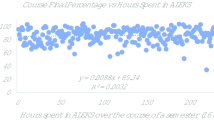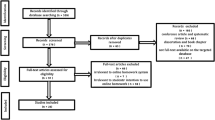Abstract
Student perceptions toward homework assigned in general chemistry courses was investigated in this study. The study participants were required to complete homework assignments using two different online systems, ALEKS (adaptive-responsive system) and Sapling (traditional-responsive system). An online survey investigating their general perceptions of homework was administered at the beginning of the semester, and after the participants had completed most of the course, another survey was administered toward the end of the semester exploring their perceptions of both homework systems used in the course. We found that most students believed homework was important to their performance in the course. Our results also showed that students’ prior experience in high school science classes had an impact on their perceptions of the amount and the frequency of homework they expected in their general chemistry course. In general, students perceived ALEKS to be a more effective tool for preparing exams, however they also complained that the system was more time-consuming compared to Sapling. For CHEM 1, we did not see a significant change in students’ performance based on their homework system preference. In conclusion, students believed homework was a tool to help them learn the subject matter better, and they generally had positive perceptions toward both online homework systems.

Similar content being viewed by others
Data Availability
The data that support the findings of this study are available from the corresponding author upon request.
References
Altun, E. (2008). 6th, 7th and 8th graders’ Attitudes towards Online Homework Assignment Sites. Turkish Online Journal of Educational Technology-TOJET, 7(4), 5–18.
Arora, M. L. (2013). Longitudinal study of online statics homework as a method to improve learning. Journal of STEM Education: Innovations and Research, 14(1).
Babaali, P., & Gonzalez, L. (2015). A quantitative analysis of the relationship between an online homework system and student achievement in pre-calculus. International Journal of Mathematical Education in Science and Technology, 46(5), 687–699.
Balli, S. J., Wedman, J. F., & Demo, D. H. (1997). Family involvement with middle-grades homework: Effects of differential prompting. The Journal of Experimental Education, 66(1), 31–48.
Bempechat, J. (2004). The motivational benefits of homework: A social-cognitive perspective. Theory into practice, 43(3), 189–196.
Bennett, S., & Kalish, N. (2007). The case against homework: How homework is hurting our children and what we can do about it. Harmony.
Buijs, M., & Admiraal, W. (2013). Homework assignments to enhance student engagement in secondary education. European journal of psychology of education, 28(3), 767–779.
Chang, C. B., Wall, D., Tare, M., Golonka, E., & Vatz, K. (2014). Relationships of attitudes toward homework and time spent on homework to course outcomes: The case of foreign language learning. Journal of Educational Psychology, 106(4), 1049.
Chen, X. (2013). STEM Attrition: College Students’ Paths into and out of STEM Fields. Statistical Analysis Report. NCES 2014-001. National Center for Education Statistics.
Cherry, K. (2020). verywellmind. Retrieved 1 Aug from https://www.verywellmind.com/perception-and-the-perceptual-process-2795839.
Cheung, S., & Leung Ngai, J. (1993). Impact of homework stress on children’s physical and psychological well-being. Journal-Hong Kong Medical Association, 44, 146–146.
Cooper, H., Robinson, J. C., & Patall, E. A. (2006). Does homework improve academic achievement? A synthesis of research, 1987–2003. Review of educational research, 76(1), 1–62.
Cunha, J., Rosário, P., Núñez, J. C., Vallejo, G., Martins, J., & Högemann, J. (2019). Does teacher homework feedback matter to 6th graders’ school engagement?: A mixed methods study. Metacognition and Learning, 14(2), 89–129.
Demirci, N. (2007). University Students’ perceptions of web-based vs. paper-based homework in a General Physics Course. Online Submission, 3(1), 29–34.
Eichler, J. F., & Peeples, J. (2013). Online homework put to the test: A report on the impact of two online learning systems on student performance in general chemistry. Journal of Chemical Education, 90(9), 1137–1143.
Epstein, J. L. (1988). Homework Practices, Achievements, and Behaviors of Elementary School Students. Report No. 26.
Epstein, J. L., & Becker, H. J. (1982). Teachers’ reported practices of parent involvement: Problems and possibilities. The elementary school journal, 83(2), 103–113.
Epstein, J. L., & Van Voorhis, F. L. (2001). More than minutes: Teachers’ roles in designing homework. Educational psychologist, 36(3), 181–193.
Fautch, J. M. (2019). Adaptive Learning Technology in General Chemistry: Does it Support Student Success? Enhancing Retention in Introductory Chemistry Courses: Teaching Practices and assessments (pp. 91–104). ACS Publications.
Galloway, M., Conner, J., & Pope, D. (2013). Nonacademic effects of homework in privileged, high-performing high schools. The Journal of Experimental Education, 81(4), 490–510.
Garlock, H. (2021). A Teacher’s Perspective on the Effectiveness of Homework at Various Grade Levels.
Gebru, M. T., Phelps, A. J., & Wulfsberg, G. (2012). Effect of clickers versus online homework on students’ long-term retention of general chemistry course material. Chemistry Education Research and Practice, 13(3), 325–329.
Graham, M. J., Frederick, J., Byars-Winston, A., Hunter, A. B., & Handelsman, J. (2013). Increasing persistence of college students in STEM. Science, 341(6153), 1455–1456.
Halcrow, C., & Dunnigan, G. (2012). Online homework in calculus I: Friend or foe? Primus, 22(8), 664–682.
Harris, R., Mack, M., Bryant, J., Theobald, E., & Freeman, S. (2020). Reducing achievement gaps in undergraduate general chemistry could lift underrepresented students into a “hyperpersistent zone. Science Advances, 6(24), eaaz5687.
Hewson, S. (2011). The mathematical problems faced by advanced STEM students. Cambridge: NRICH. Available via: http://nrich.maths.org/6458 (last accessed 10/07/2015).
Hibbard, L., Sung, S., & Wells, B. (2016). Examining the effectiveness of a semi-self-paced flipped learning format in a college general chemistry sequence. Journal of Chemical Education, 93(1), 24–30.
Hoover-Dempsey, K. V., Bassler, O. C., & Burow, R. (1995). Parents’ reported involvement in students’ homework: Strategies and practices. The elementary school journal, 95(5), 435–450.
Ismail, M., Mokhtar, W., Nasir, N., Rashid, N., & Ariffin, A. (2014). The development of a web-based homework system (WBH) via TCExam. Mediterranean Journal of Social Sciences, 5(15), 249.
Kouzma, N. M., & Kennedy, G. A. (2002). Homework, stress, and mood disturbance in senior high school students. Psychological Reports, 91(1), 193–198.
LEARNING, M. (2019). Sapling Learning. Retrieved 28 July from https://www.macmillanlearning.com/college/us/digital/sapling.
Lindsay, P. H., & Norman, D. A. (2013). Human information processing: An introduction to psychology. Academic press.
Mathai, E., & Olsen, D. (2013). Studying the effectiveness of online homework for different skill levels in a college algebra course. Primus, 23(8), 671–682.
MCGRAW-HILL (2019). Overview of ALEKS. Retrieved 28 July from https://www.aleks.com/aboutaleks/overview.
Moe, A., Katz, I., Cohen, R., & Alesi, M. (2020). Reducing homework stress by increasing adoption of need-supportive practices: Effects of an intervention with parents. Learning and Individual Differences, 82, 101921.
Nabulsi, L., Nguyen, A., & Odeleye, O. (2021). A comparison of the effects of two different online homework systems on levels of knowledge retention in general chemistry students. Journal of Science Education and Technology, 30(1), 31–39.
Núñez, J. C., Suárez, N., Rosário, P., Vallejo, G., Cerezo, R., & Valle, A. (2015). Teachers’ feedback on homework, homework-related behaviors, and academic achievement. the Journal of Educational research, 108(3), 204–216.
Olson, S., & Riordan, D. G. (2012). Engage to excel: Producing one million additional college graduates with degrees in science, technology, engineering, and mathematics. Report to the president. Executive Office of the President.
Raccanello, D., Brondino, M., Moè, A., Stupnisky, R., & Lichtenfeld, S. (2019). Enjoyment, boredom, anxiety in elementary schools in two domains: Relations with achievement. The Journal of Experimental Education, 87(3), 449–469.
Richards-Babb, M., Drelick, J., Henry, Z., & Robertson-Honecker, J. (2011). Online homework, help or hindrance? What students think and how they perform. Journal of College Science Teaching, 40(4).
Richards-Babb, M., Curtis, R., Georgieva, Z., & Penn, J. H. (2015). Student perceptions of online homework use for formative assessment of learning in organic chemistry. Journal of Chemical Education, 92(11), 1813–1819.
Richards-Babb, M., Curtis, R., Ratcliff, B., Roy, A., & Mikalik, T. (2018). General chemistry student attitudes and success with use of online homework: Traditional-responsive versus adaptive-responsive. Journal of Chemical Education, 95(5), 691–699.
Riffell, S. K., & Sibley, D. F. (2004). Can hybrid course formats increase attendance in undergraduate environmental science courses? Journal of Natural Resources and Life Sciences Education, 33(1), 16–20.
Ryan, M. D., & Reid, S. A. (2016). Impact of the flipped classroom on student performance and retention: A parallel controlled study in general chemistry. Journal of Chemical Education, 93(1), 13–23.
Sarmiento, C. P. (2017). Student perceptions of online homework in mathematics of accounting and finance. Advanced Science Letters, 23(2), 1122–1125.
Shedlosky-Shoemaker, R., & Fautch, J. M. (2015). Who leaves, who stays? Psychological predictors of undergraduate chemistry students’ persistence. Journal of Chemical Education, 92(3), 408–414.
Stickles, P. R. (2017). The implementation of online homework in College Algebra and its results. Illinois Mathematics Teacher, 64(1), 6–15.
Trautwein, U. (2007). The homework–achievement relation reconsidered: Differentiating homework time, homework frequency, and homework effort. Learning and instruction, 17(3), 372–388.
Walberg, H. J., & Paik, S. J. (2000). Effective Educational Practices. Educational Practices Series–3.
Xu, J., & Yuan, R. (2003). Doing homework: Listening to students,‘parents,‘and teachers’ voices in one urban middle school community. School Community Journal, 13(2), 25.
Yoblinski, B. (2003). Sequencing general chemistry. Journal of College Science Teaching, 32(6), 382.
Zare, R. N., Cox, C. T. Jr., Murphy, K., & Bayas, C. (2017). Implementation of peer-reviewed homework assignments. Journal of College Science Teaching, 46(3).
Funding
The authors did not receive support from any organization for the submitted work.
Author information
Authors and Affiliations
Corresponding author
Ethics declarations
Competing Interests
The authors declare that they have no known competing financial interests or personal relationships that could have appeared to influence the work reported in this paper.
Ethics Approval
The procedures performed in studies involving human participants were in accordance with the ethical standards of the institutional and/or national research committee and with the 1964 Helsinki Declaration and its later amendments or comparable ethical standards. This study was approved by the institutional review board (IRB) at University of Oklahoma (OU-NC IRB Number: 11054).
Informed Consent
was obtained from all individual participants included in the study.
Consent to Publish
The authors affirm that human research participants provided informed consent for publication.
Additional information
Publisher’s Note
Springer Nature remains neutral with regard to jurisdictional claims in published maps and institutional affiliations.
Rights and permissions
Springer Nature or its licensor (e.g. a society or other partner) holds exclusive rights to this article under a publishing agreement with the author(s) or other rightsholder(s); author self-archiving of the accepted manuscript version of this article is solely governed by the terms of such publishing agreement and applicable law.
About this article
Cite this article
Tang, D., Odeleye, O. Students’ Perceptions on the Impact of Online Homework Systems on Their Performance in a General Chemistry Course. J Sci Educ Technol 32, 710–721 (2023). https://doi.org/10.1007/s10956-023-10061-0
Accepted:
Published:
Issue Date:
DOI: https://doi.org/10.1007/s10956-023-10061-0




